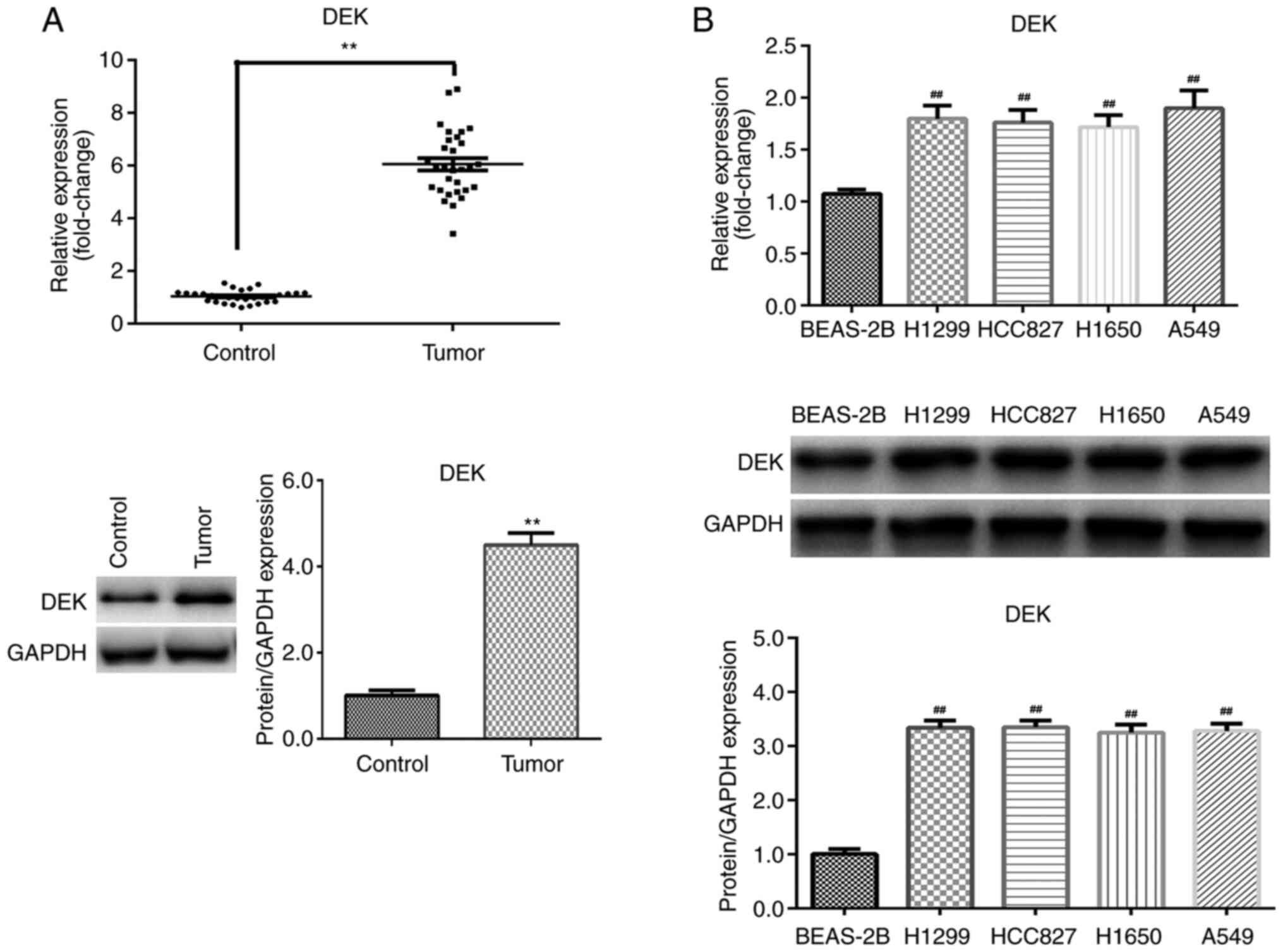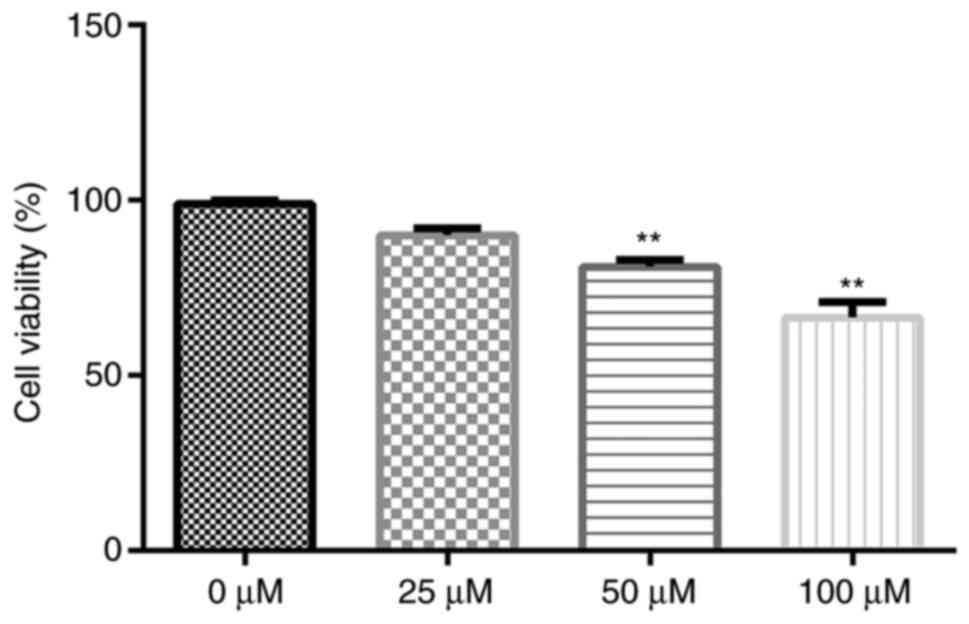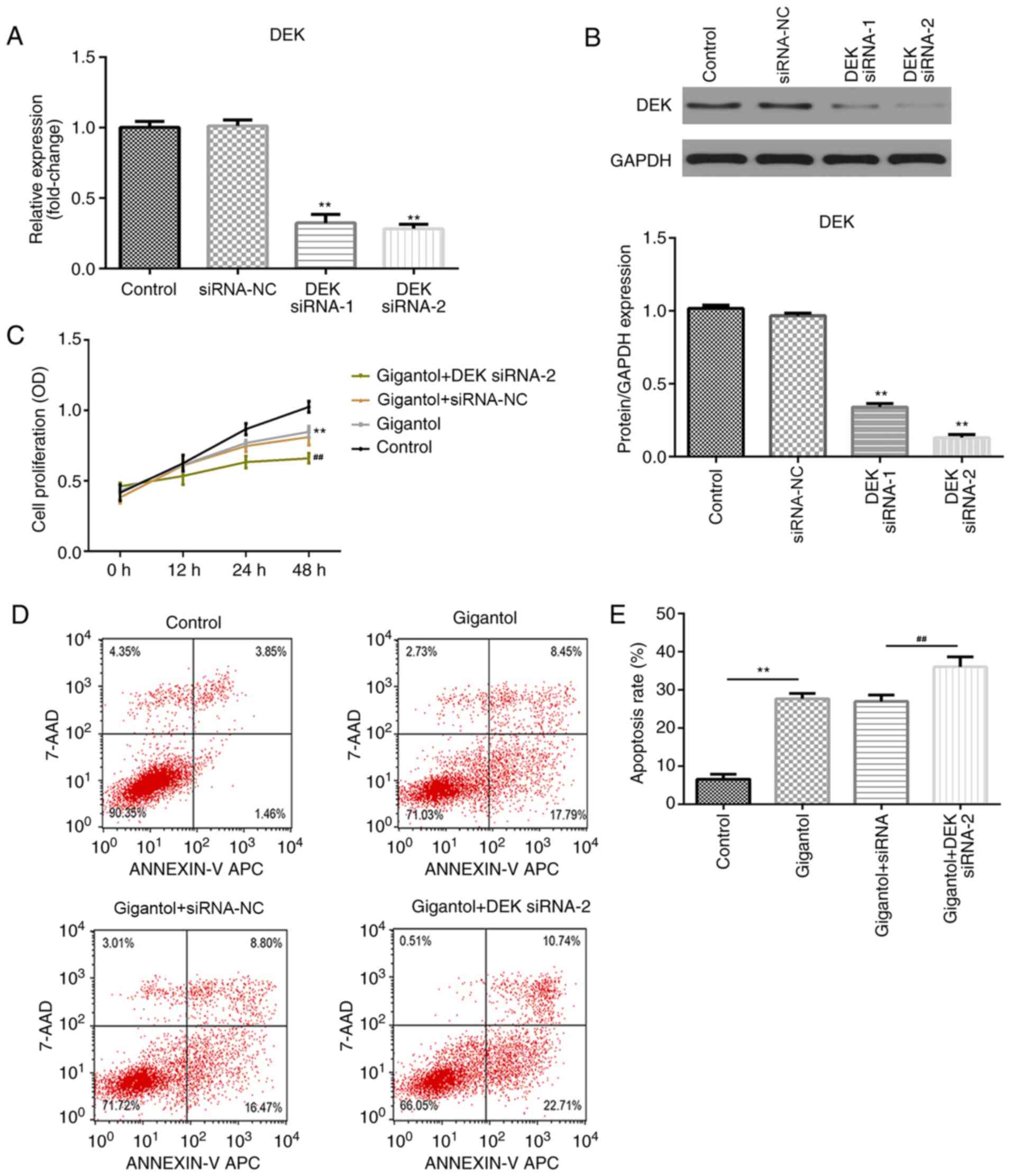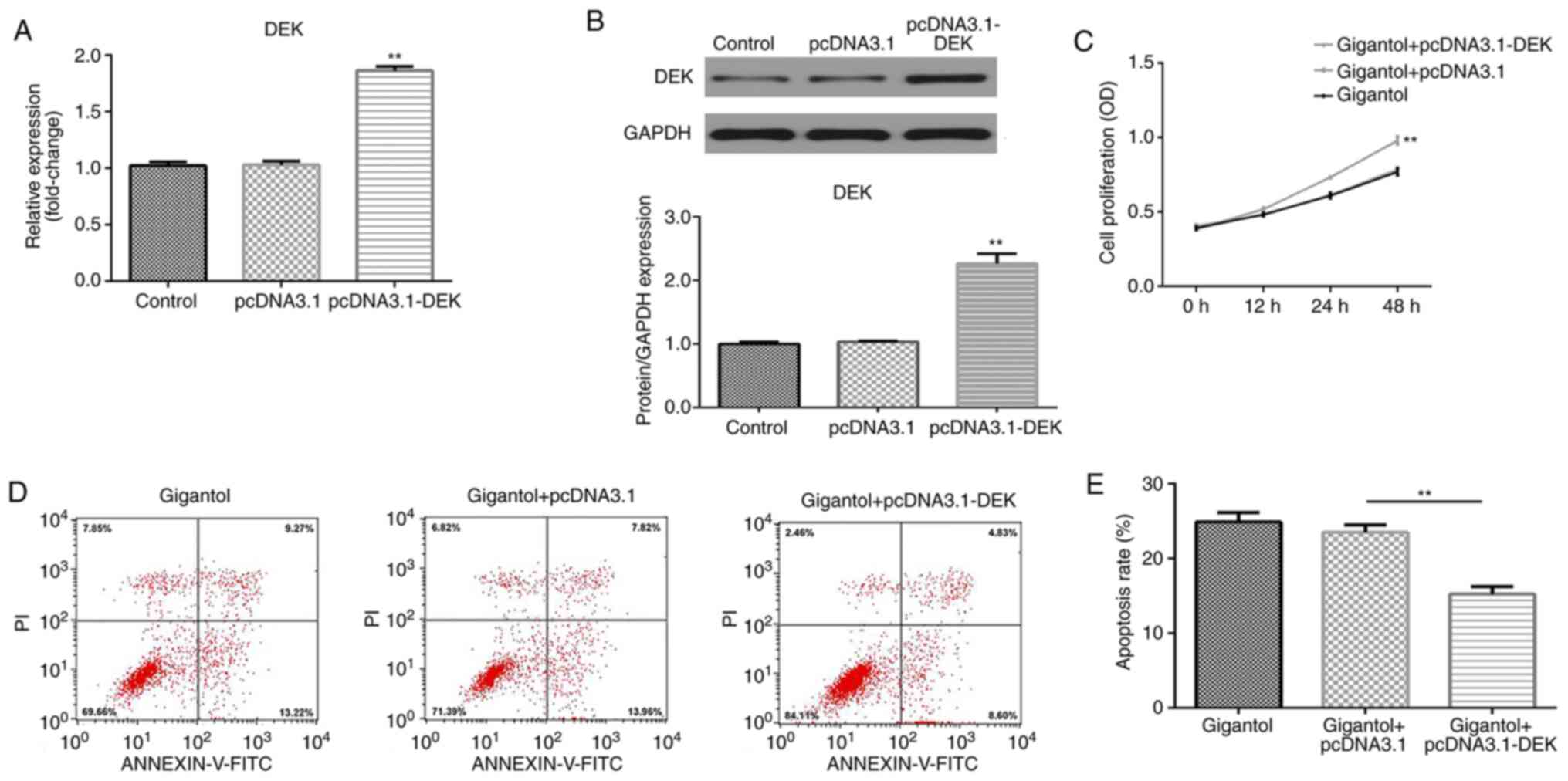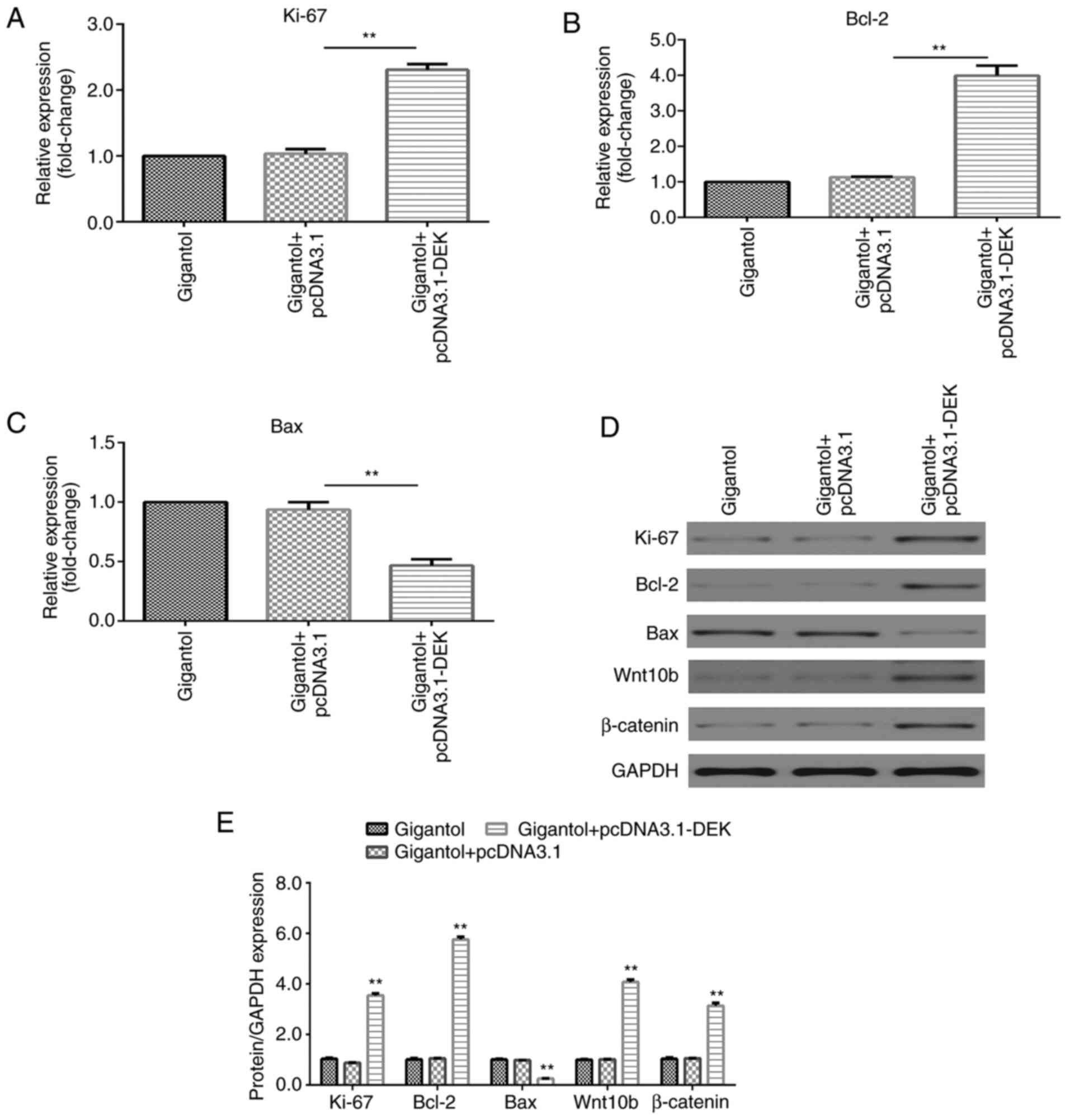|
1
|
Carbone DP, Gandara DR, Antonia SJ,
Zielinski C and Paz-Ares L: Non-small-cell lung cancer: Role of the
immune system and potential for immunotherapy. J Thorac Oncol.
10:974–984. 2015.PubMed/NCBI View Article : Google Scholar
|
|
2
|
Gu H, Chen J, Song Y and Shao H: Gastric
adenocarcinoma predictive long intergenic non-coding RNA promotes
tumor occurrence and progression in non-small cell lung cancer via
regulation of the miR-661/eEF2K signaling pathway. Cell Physiol
Biochem. 51:2136–2147. 2018.PubMed/NCBI View Article : Google Scholar
|
|
3
|
Gridelli C, Rossi A, Carbone DP, Guarize
J, Karachaliou N, Mok T, Petrella F, Spaggiari L and Rosell R:
Non-small-cell lung cancer. Nat Rev Dis Primers.
1(15009)2015.PubMed/NCBI View Article : Google Scholar
|
|
4
|
Kumarakulasinghe NB, van Zanwijk N and Soo
RA: Molecular targeted therapy in the treatment of advanced stage
non-small cell lung cancer (NSCLC). Respirology. 20:370–378.
2015.PubMed/NCBI View Article : Google Scholar
|
|
5
|
Lam Y, Ng TB, Yao RM, Shi J, Xu K, Sze SC
and Zhang KY: Evaluation of chemical constituents and important
mechanism of pharmacological biology in Dendrobium plants. Evid
Based Compement Alternat Med. 2015(841752)2015.PubMed/NCBI View Article : Google Scholar
|
|
6
|
Chen X, Wang F, Wang Y, Li X, Wang A, Wang
C and Guo S: Discrimination of the rare medicinal plant Dendrobium
officinale based on naringenin, bibenzyl, and polysaccharides. Sci
China Life Sci. 55:1092–1099. 2012.PubMed/NCBI View Article : Google Scholar
|
|
7
|
Zheng S, Zhu Y, Jiao C, Shi M, Wei L, Zhou
Y, Jin Q and Cai Y: Extraction and analysis of gigantol from
Dendrobium officinale with response surface methodology. Molecules.
23(818)2018.PubMed/NCBI View Article : Google Scholar
|
|
8
|
Ng TB, Liu J, Wong JH, Ye X, Wing Sze SC,
Tong Y and Zhang KY: Review of research on Dendrobium, a prized
folk medicine. Appl Microbiol Biotechnol. 93:1795–1803.
2012.PubMed/NCBI View Article : Google Scholar
|
|
9
|
Won JH, Kim JY, Yun KJ, Lee JH, Back NI,
Chung HG, Chung SA, Jeong TS, Choi MS and Lee KT: Gigantol isolated
from the whole plants of Cymbidium goeringii inhibits the
LPS-induced iNOS and COX-2 expression via NF-kappaB inactivation in
RAW 264.7 macrophages cells. Planta Med. 72:1181–1187.
2006.PubMed/NCBI View Article : Google Scholar
|
|
10
|
Simmler C, Antheaume C and Lobstein A:
Antioxidant biomarkers from Vanda coerulea stems reduce irradiated
HaCaT PGE-2 production as a result of COX-2 inhibition. PLoS One.
5(e13713)2010.PubMed/NCBI View Article : Google Scholar
|
|
11
|
Fan C, Wang W, Wang Y, Qin G and Zhao W:
Chemical constituents from Dendrobium densiflorum. Phytochemistry.
57:1255–1258. 2001.PubMed/NCBI View Article : Google Scholar
|
|
12
|
Wu J, Li X, Wan W, Yang Q, Ma W, Chen D,
Hu J, Chen CO and Wei X: Gigantol from Dendrobium chrysotoxum
Lindl. binds and inhibits aldose reductase gene to exert its
anti-cataract activity: An in vitro mechanistic study. J
Ethnopharmacol. 198:255–261. 2017.PubMed/NCBI View Article : Google Scholar
|
|
13
|
Wu J, Li X, Fang H, Yi Y, Chen D, Long Y,
Gao X, Wei X and Chen CY: Investigation of synergistic mechanism
and identification of interaction site of aldose reductase with the
combination of gigantol and syringic acid for prevention of
diabetic cataract. BMC Complement Altern Med.
16(286)2016.PubMed/NCBI View Article : Google Scholar
|
|
14
|
Yu S, Wang Z, Su Z, Song J, Zhou L, Sun Q,
Liu S, Li S, Li Y, Wang M, et al: Gigantol inhibits Wnt/β-catenin
signaling and exhibits anticancer activity in breast cancer cells.
BMC Complement Altern Med. 18(59)2018.PubMed/NCBI View Article : Google Scholar
|
|
15
|
Chen H, Huang Y, Huang J, Lin L and Wei G:
Gigantol attenuates the proliferation of human liver cancer HepG2
cells through the PI3K/Akt/NF-κB signaling pathway. Oncol Rep.
37:865–870. 2017.PubMed/NCBI View Article : Google Scholar
|
|
16
|
Unahabhokha T, Chanvorachote P and
Pongrakhananon V: The attenuation of epithelial to mesenchymal
transition and induction of anoikis by gigantol in human lung
cancer H460 cells. Tumour Biol. 37:8633–8641. 2016.PubMed/NCBI View Article : Google Scholar
|
|
17
|
Charoenrungruang S, Chanvorachote P,
Sritularak B and Pongrakhananon V: Gigantol, a bibenzyl from
Dendrobium draconis, inhibits the migratory behavior of non-small
cell lung cancer cells. J Nat Prod. 77:1359–1366. 2014.PubMed/NCBI View Article : Google Scholar
|
|
18
|
von Lindern M, Breems D, van Baal S,
Adriaansen H and Grosveld G: Characterization of the translocation
breakpoint sequences of two DEK-CAN fusion genes present in t(6;9)
acute myeloid leukemia and a SET-CAN fusion gene found in a case of
acute undifferentiated leukemia. Genes Chromosomes Cancer.
5:227–234. 1992.PubMed/NCBI View Article : Google Scholar
|
|
19
|
Waldmann T, Scholten I, Kappes F, Hu HG
and Knippers R: The DEK protein-an abundant and ubiquitous
constituent of mammalian chromatin. Gene. 343:1–9. 2004.PubMed/NCBI View Article : Google Scholar
|
|
20
|
Hu HG, Scholten I, Gruss C and Knippers R:
The distribution of the DEK protein in mammalian chromatin. Biochem
Biophys Res Commun. 358:1008–1014. 2007.PubMed/NCBI View Article : Google Scholar
|
|
21
|
Riveiro-Falkenbach E and Soengas MS:
Control of tumorigenesis and chemoresistance by the DEK oncogene.
Clin Cancer Res. 16:2932–2938. 2010.PubMed/NCBI View Article : Google Scholar
|
|
22
|
Liu X, Qi D, Qi J, Mao Z, Li X, Zhang J,
Li J and Gao W: Significance of DEK overexpression for the
prognostic evaluation of non-small cell lung carcinoma. Oncol Rep.
35:155–162. 2016.PubMed/NCBI View Article : Google Scholar
|
|
23
|
Livak KJ and Schmittgen TD: Analysis of
relative gene expression data using real-time quantitative PCR and
the 2(-Delta DeltaC(T)) method. Methods. 25:402–408.
2001.PubMed/NCBI View Article : Google Scholar
|
|
24
|
Feng T, Liu Y, Li C, Li Z and Cai H: DEK
proto-oncogene is highly expressed in astrocytic tumors and
regulates glioblastoma cell proliferation and apoptosis. Tumour
Biol. 39(1010428317716248)2017.PubMed/NCBI View Article : Google Scholar
|
|
25
|
Wise-Draper TM, Mintz-Cole RA, Morris TA,
Simpson DS, Wikenheiser-Brokamp KA, Currier MA, Cripe TP, Grosveld
GC and Wells SI: Overexpression of the cellular DEK protein
promotes epithelial transformation in vitro and in vivo. Cancer
Res. 69:1792–1799. 2009.PubMed/NCBI View Article : Google Scholar
|
|
26
|
Hui W, Ma X, Zan Y, Song L, Zhang S and
Dong L: MicroRNA-1292-5p inhibits cell growth, migration and
invasion of gastric carcinoma by targeting DEK. Am J Cancer Res.
8:1228–1238. 2018.PubMed/NCBI
|
|
27
|
Piao J, Shang Y, Liu S, Piao Y, Cui X, Li
Y and Lin Z: High expression of DEK predicts poor prognosis of
gastric adenocarcinoma. Diagn Pathol. 9(67)2014.PubMed/NCBI View Article : Google Scholar
|
|
28
|
Lin L, Piao J, Gao W, Piao Y, Jin G, Ma Y,
Li J and Lin Z: DEK over expression as an independent biomarker for
poor prognosis in colorectal cancer. BMC Cancer.
13(366)2013.PubMed/NCBI View Article : Google Scholar
|
|
29
|
Zhou QC, Deng XF, Yang J, Jiang H, Qiao
MX, Liu HH, Qian Z, Hou LL and Hu HG: Oncogene DEK is highly
expressed in lung cancerous tissues and positively regulates cell
proliferation as well as invasion. Oncol Lett. 15:8573–8581.
2018.PubMed/NCBI View Article : Google Scholar
|
|
30
|
Bhummaphan N and Chanvorachote P: Gigantol
suppresses cancer stem cell-like phenotypes in lung cancer cells.
Evid Based Complement Alternat Med. 2015(836564)2015.PubMed/NCBI View Article : Google Scholar
|
|
31
|
Unahabhokha T, Chanvorachote P, Sritularak
B, Kitsongsermthon J and Pongrakhananon V: Gigantol inhibits
epithelial to mesenchymal process in human lung cancer cells. Evid
Based Complement Alternat Med. 2016(4561674)2016.PubMed/NCBI View Article : Google Scholar
|
|
32
|
Gerdes J, Schwab U, Lemke H and Stein H:
Production of a mouse monoclonal antibody reactive with a human
nuclear antigen associated with cell proliferation. Int J Cancer.
31:13–20. 1983.PubMed/NCBI View Article : Google Scholar
|
|
33
|
Harris MH and Thompson CB: The role of the
Bcl-2 family in the regulation of outer mitochondrial membrane
permeability. Cell Death Differ. 7:1182–1191. 2000.PubMed/NCBI View Article : Google Scholar
|
|
34
|
Lin L, Piao J, Ma Y, Jin T, Quan C, Kong
J, Li Y and Lin Z: Mechanisms underlying cancer growth and
apoptosis by DEK overexpression in colorectal cancer. PLoS One.
9(e111260)2014.PubMed/NCBI View Article : Google Scholar
|
|
35
|
Stewart DJ: Wnt signaling pathway in
non-small cell lung cancer. J Natl Cancer Inst.
106(djt356)2014.PubMed/NCBI View Article : Google Scholar
|
|
36
|
Privette Vinnedge LM, Benight NM, Wagh PK,
Pease NA, Nashu MA, Serrano-Lopez J, Adams AK, Cancelas JA, Waltz
SE and Wells SI: The DEK oncogene promotes cellular proliferation
through paracrine Wnt signaling in Ron receptor-positive breast
cancers. Oncogene. 34:2325–2336. 2015.PubMed/NCBI View Article : Google Scholar
|















